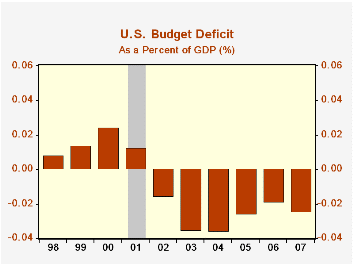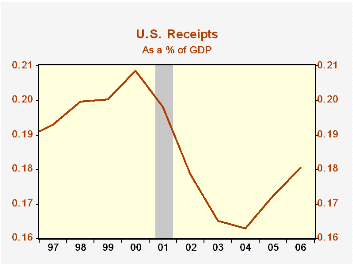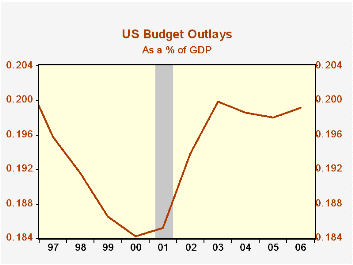 Global| Oct 16 2006
Global| Oct 16 2006Higher Receipts Lower U.S. Budget Deficit
by:Tom Moeller
|in:Economy in Brief
Summary
The U.S. federal government's budget deficit for FY 2006 fell to $247.7B following deficits near $300B during 2005 and $400B during 2004. The full year figure compared favorably to the August estimate from the Congressional Budget [...]

The U.S. federal government's budget deficit for FY 2006 fell to $247.7B following deficits near $300B during 2005 and $400B during 2004. The full year figure compared favorably to the August estimate from the Congressional Budget Office of a $260B deficit. CBO expects the FY 2007 deficit to total $286B.
As a percentage of GDP, the U.S. budget deficit fell to 1.9% from 2.6% in FY2005 but may return to 2.5% during the current year.
Net revenues grew 11.8% during FY2006. Individual income tax receipts (44% of total receipts) registered 12.6% growth after a 14.6% surge the prior year. Withheld taxes rose 7.9% due to growth in employment, nearly double the 4.4% gain during the prior fiscal year, and that was up from 2.5% growth during FY2004. Non-withheld taxes (primarily on capital gains) surged 20.7%, slightly slower than the 31.9% gain during FY2005. Corporate income taxes (13% of total receipts) surged 27.2% as corporate profits grew. Estate & gift taxes increased by 12.6% while higher employment levels raised social insurance & retirement receipts by 5.5%.
As a percentage of GDP revenues rose to 18.1%, the highest level in five years.
U.S. net outlays grew 7.4% last year versus 7.8% growth during FY2005. Defense spending (19% of total outlays) grew 6.8%, down from 8.6% growth during FY2005. Medicare expenditures (12% of outlays) advanced 10.5%, about stable with the prior year's growth, and social security spending (21% of outlays) rose a diminished 4.8%. Higher interest rates boosted the government's interest expense by 23.2% y/y.
As a percentage of GDP outlays rose to 19.9%, up more than one percentage point since 2000.
The Budget Results for Fiscal Year 2006 from the U.S. Treasury Department can be found here.
CBO's baseline projections of the U.S. budget are available here.
| US Government Finance | September | August | Y/Y | FY 2006 | FY 2005 | FY 2004 |
|---|---|---|---|---|---|---|
| Budget Balance | $56.0B | -$64.9B | $35.2B (9/05) |
-$247.7 | -$318.7B | -$412.7B |
| Net Revenues | $283.3B | $153.9B | 12.6% | 11.8% | 14.5% | 5.5% |
| Net Outlays | $227.3B | $218.8B | 5.0% | 7.4% | 7.8% | 6.2% |
Tom Moeller
AuthorMore in Author Profile »Prior to joining Haver Analytics in 2000, Mr. Moeller worked as the Economist at Chancellor Capital Management from 1985 to 1999. There, he developed comprehensive economic forecasts and interpreted economic data for equity and fixed income portfolio managers. Also at Chancellor, Mr. Moeller worked as an equity analyst and was responsible for researching and rating companies in the economically sensitive automobile and housing industries for investment in Chancellor’s equity portfolio. Prior to joining Chancellor, Mr. Moeller was an Economist at Citibank from 1979 to 1984. He also analyzed pricing behavior in the metals industry for the Council on Wage and Price Stability in Washington, D.C. In 1999, Mr. Moeller received the award for most accurate forecast from the Forecasters' Club of New York. From 1990 to 1992 he was President of the New York Association for Business Economists. Mr. Moeller earned an M.B.A. in Finance from Fordham University, where he graduated in 1987. He holds a Bachelor of Arts in Economics from George Washington University.
More Economy in Brief
 Global| Feb 05 2026
Global| Feb 05 2026Charts of the Week: Balanced Policy, Resilient Data and AI Narratives
by:Andrew Cates






